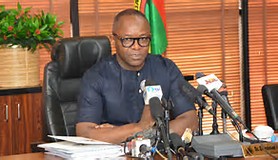The Nigeria’s oil and gas industry would require $10 billion (N3.05 trillion) over the next three years to increase crude oil production from 2.2 million barrels per day (bpd) to 3 million bpd.
The Minister of State for Petroleum Resources, Ibe Kachikwu, who made this disclosure in the current Organisation of the Petroleum Exporting Countries (OPEC) Bulletin, said investment is needed to maintain essential work.
According to Kachikwu, “Nigeria’s normal production level is about 2.2m bpd and the government would like to raise it to 3m bpd. Just to get the fields online and cap them will require an average of about $10 billion per year in investments over the next three to four years.”
There are also some dedicated projects in the Bonga oil field, he added, noting that Italy’s Agip plans to spend about $10 billion, while Royal Dutch Shell is hoping to spend $10 to $11billion on the field.
“We are fairly close to identifying dedicated investments upstream. Downstream is a challenge. We need to invest in our refineries. We need to do pipelines.”He put the industry’s infrastructure gap in the midstream and downstream to be about $30 to $40billion, saying that some of the required investments could come from Nigerians with investment capabilities, rather than being restricted to investors abroad.
Kachikwu also commented on refining direct purchase agreements, which were introduced last year, as well as associated crude-for-product exchanges, stating that refineries are not working well, and are only producing about 10 to15 per cent of the country’s requirements, with most products being imported.
To tackle the problem, the Petroleum Ministry decided that rather than have middlemen sell Nigeria’s products and (import finished products), it tried “to achieve synergy by giving the crude to an established refinery to process it and bring it back to us.”
He added that the move was “worth the effort,” as it saved the country billions of dollars in his first year as Minister, adding that the refineries would be repaired hopefully between 2019 and 2020.
“But over and above that, we want those involved in this trading to begin to invest in refineries. I think it’s a shame that we are still importing so much product. When the government came in two years ago, that was a major concern for us.”
Currently, he said supplies are better, but there is still a fundamental need to focus on local demand.The Group Managing Director, Nigerian National Petroleum Corporation (NNPC), Dr Maikati Baru, said recently that with improved security in the Niger Delta, and resumption of production on the Forcados Oil Terminal, FOT, and Qua Iboe Terminal, QIT, pipelines, average national production is expected to grow and surpass the 2017 target of 2.2 million barrels of oil and condensate per day.
COPYRIGHT THEGUARDIAN

